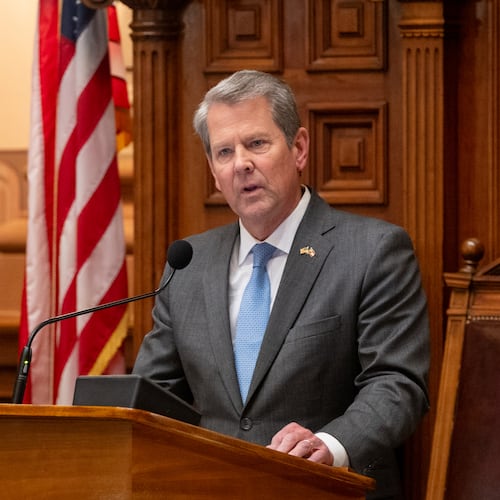At the beginning of the 2025 legislative session at the Georgia State Capitol, more than 100 housing-related bills were on the agenda, mirroring the large scale of the Peach State’s housing crisis.
Fewer than 10 housing bills survived Crossover Day on March 6 — a deadline marking whether bills move from the House to the Senate in the Georgia General Assembly or, in a two-year session, are left in limbo until 2026.
And after an abrupt end to this year’s session on April 4, housing advocates were left mulling over the losses after legislation to rein in institutional investors, cap rents, protect tenant rights and invest more in affordable housing mostly fell by the wayside.
Beyond the bipartisan wrangling under the Gold Dome, however, the housing crisis continues unabated.
“We as a community are paying the price of failing to provide access to safe, decent, affordable housing,” said Elizabeth Appley, an attorney and public policy expert who advocates for housing legislation at the statehouse. “We pay for it in the children failing to advance in school and parents losing their jobs and losing their property.”
One hot-button issue advocates hoped Democrats and Republicans would rally around was regulation of institutional investment in single-family and multifamily housing — with hedge funds and corporate landlords taking part of the blame for swelling rents and house prices.
Metro Atlanta has been described as “ground zero” for Wall Street investment in housing, as chronicled in The Atlanta Journal-Constitution’s investigative series American Dream for Rent.
House Bill 555 would have capped institutional investor ownership in the state at no more than 2,000 single-family homes or 10 multifamily properties. But it stalled without reaching the House floor for a vote.
Another bill, House Bill 374, failed to progress. It proposed a housing management database, or rental registry, to identify owners of 10 or more properties, as well as disclosure of properties owned by “foreign adversaries.”
In the end, House Bill 399 was the only significant action against absentee corporate landlords.
A November 2024 analysis by the Atlanta Regional Commission found that seven corporations own more than 51,000 single-family rental homes in the Atlanta region.
HB 399 did not address affordability, but if signed into law, landlords with single-family or duplex homes would need to assign a local agent for tenant complaints.
Natallie Keiser of Atlanta housing advocacy group HouseATL said the effectiveness of the legislation remains to be seen. She said some renters fear complaining about code violations because of landlord retaliation, and she said the bill puts the burden on them to voice their concerns.
“It doesn’t really make any sense for that to be on tenants,” Keiser said.
Budget battles
Credit: arvin.temkar@ajc.com
Credit: arvin.temkar@ajc.com
For some lawmakers, the biggest disappointment was that a state with an $11.5 billion budget surplus did not commit more money for affordable housing, eviction relief and homelessness.
Nationwide, experts have said there is a housing deficit of between 4 million and 7 million homes. Last year, the Housing Underproduction in the U.S. annual report said the metro Atlanta region had a shortfall of about 100,000 homes.
The median rent for a two-bedroom residence is still about $2,000, according to tech real estate company Zillow. The median home price in Georgia is close to $325,000 — which pushes homeownership out of reach for many low- and middle-income people.
Under a budget lawmakers passed in April, there was an increase of $2 million for the State Housing Trust Fund for the Homeless within the Department of Community Affairs, down from the House’s proposed increase of $4 million.
The state allocated $7.83 million to the fund, including the $2 million increase. Appley said the money can be used for issues beyond funding homeless service providers, including loans and grants for safe and affordable housing, or mortgage and down payment assistance.
Democratic state Rep. Mary Margaret Oliver, of Decatur, sponsored the landlord-agent requirement for absentee owners. Oliver said she was hoping lawmakers would agree to commit as much as $50 million to the fund.
“From the state’s perspective, it was my biggest disappointment that the Housing Trust Fund did not receive a substantial boost of funding,” Oliver said.
Last year, Dalton Republican Kasey Carpenter celebrated the passage of a bill called the Safe at Home Act, which granted modest protections to people living in neglected apartment complexes.
This year, eviction-prevention legislation that Carpenter sponsored — House Bill 689 — would have helped keep people in their homes when COVID-era emergency rental relief ends in September. The bill passed the State Planning and Community Affairs Committee but did not get a vote on the House floor before Crossover Day.
“There’s no telling how much it would save in societal costs,” Carpenter told the AJC, adding he hoped to revive the bill in 2026.
He suggested the failure to act could be more costly down the road: “Now, you’re dealing with children and people that have been evicted and are living on the streets.”
Appley said advocates supported Carpenter’s bill and the proposed $25 million a year in flexible local grants to continue the rental assistance program and help people avoid eviction and homelessness.
In response to the concerns about funding, Kemp spokesperson Garrison Douglas cited the $91.7 million the state had committed so far to the Rural Workforce Housing Initiative and $42 million in infrastructure grants awarded to 21 rural communities.
“Under his leadership, and in partnership with the Georgia General Assembly, the state of Georgia has made historic investments in addressing housing availability, infrastructure and streamlining government processes,” Douglas said in a statement.
Small victories
Credit: Natrice Miller/AJC
Credit: Natrice Miller/AJC
Others, like Matthew Nursey of the Housing Justice League, are braced for a yearslong fight on issues like repealing the state’s ban on rent control, which allows landlords to freely raise rents.
He said there were some positives to be taken from this year’s session, despite the setbacks.
“The crisis has gotten so untenable that I think there’s an admittance on both sides of the aisle that this is something that they have to (work) on,” Nursey said.
Some lawmakers and advocates were cheered that punitive legislation criminalizing residents at extended-stay hotels and the homeless hit a roadblock — though in a two-year legislative session those bills could make a comeback.
Appley said the extended-stay measure would have criminalized vulnerable families living long term at the hotels as trespassers, as well as making it easier for hotel owners to evict them without due process.
The provision in expanded squatting legislation, House Bill 61, would have undone the limited protections granted to residents in the Georgia Supreme Court ruling Efficiency Lodge Inc. v. Neason.
That ruling found that, under certain circumstances, people living in hotel rooms could claim tenant rights — meaning a hotel owner would need to go through eviction court to remove them.
Oliver said she fears the measure could resurface.
“I was appalled that the industry, which is already so profitable, was taking further steps to reverse a Georgia Supreme Court case,” Oliver said. “It was just a horrific idea that we were going to further burden them with elimination of any tenant rights.”
In March, the measure’s lead sponsor, Marietta Republican Devan Seabaugh, defended the bill, stating the intent was not to punish long-term residents at hotels but to protect business owners from trespassers.
“When someone refuses to leave after their agreed stay or tries to claim tenant rights without paying, it threatens the entire business model and reduces availability for others who need temporary housing,” Seabaugh said.
Another measure, House Bill 295, would allow private citizens to file lawsuits against cities and counties for “loss of property value or expenses” over the failure to clear homeless encampments. It didn’t pass, but advocates will be closely watching in 2026 to see if lawmakers revive the measure.
The Cicero Institute think tank was advocating for the bill. The group has pushed a strategy of moving unhoused people off the streets and into “designated camping” areas on public land that would include portable showers, toilets and other amenities.
“By providing a designated camp for people to go, public spaces are preserved, health and sanitation issues are effectively addressed and services can be specifically targeted to those in need,” the group says on its website.
Appley said housing is the answer, not more homeless encampments.
“That’s no solution to homelessness, and criminal sanctions only make it harder for a person to leave homelessness. It doesn’t end homelessness,” she said.
Credit: arvin.temkar@ajc.com
Credit: arvin.temkar@ajc.com
About the Author
Keep Reading
The Latest
Featured



